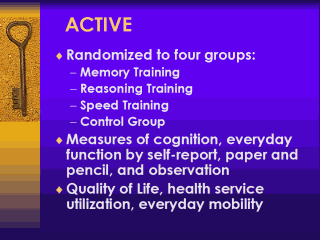 |
They randomized people into four groups. They’ve got memory
training, reasoning training, speed training, and a control group which really just gets
the repeat measures – has no actual intervention. They also did something which no other
study has done all at once. They included self-report, paper and pencil measures, and
observation to have a sense of how people are really changing and if how you measure it
may show something differently. They also looked at quality of life and health service
utilization and everyday mobility. Let me go back here. They’re hoping to find out
rather or not any of these interventions change real life activity. They acknowledged that
one of the things that has been missing is that we know that if you go to a class and they
like train you on something we have shown, at least in some studies, that you will do
better on a test at the end. But how do people do in everyday life? This study is probably
the best I’ve seen designed so far that may start to answer that but I don’t have the
answers on that one yet. |
